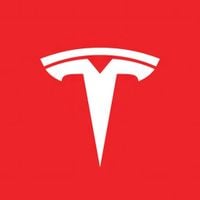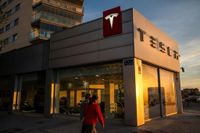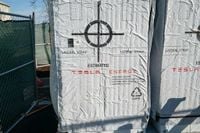Tesla, Inc. (NASDAQ:TSLA) has reported its first-quarter earnings for 2025, revealing a significant revenue decline and a drop in vehicle deliveries. The results were released after the closing bell on April 22, 2025, and they have sparked concerns about the company's future performance amid various challenges, including changing production lines and external pressures from trade policies.
For the first quarter, Tesla's revenue fell 9% year-over-year to $19.3 billion, primarily impacted by changes in the production line for its popular Model Y. Vehicle deliveries also suffered, dropping 13% to 336,681 units. The company’s GAAP operating income plummeted 66% to $399 million, raising questions about its profitability moving forward.
Despite the disappointing figures, Tesla's energy generation and storage division saw remarkable growth, with revenues increasing by 67% to $2.73 billion. Additionally, storage deployments surged by 154%, reaching 10.4 GWh.
CEO Elon Musk addressed these results during the earnings call, emphasizing that Tesla is not on the brink of failure. He stated, "We’re not on the ragged edge of death…not even close," and expressed confidence in the future of the company. Musk acknowledged the challenges posed by vandalism and hostility towards the brand, which he claimed have hurt sales.
Looking ahead, Tesla has confirmed plans to introduce new more affordable models starting production in the first half of 2025. These models are expected to leverage existing manufacturing lines, which may result in a slower ramp-up than initially anticipated. Musk mentioned that the company is laser-focused on its upcoming robotaxi service, which is set to launch in Austin, Texas, in June 2025.
However, Musk's involvement in political matters, particularly with the Department of Government Efficiency (DOGE), has drawn criticism. Analysts from Wedbush have noted that Tesla is at a "crossroads" due to Musk's dual role, which they believe has damaged the brand. Dan Ives from Wedbush stated, "Tesla has now unfortunately become a political symbol globally of the Trump Administration/DOGE," indicating that this association may have affected the company's public perception and sales.
During the earnings call, Musk also discussed the impact of President Donald Trump’s tariff policies on Tesla's profitability. He stated, "The tariff decision is entirely up to the President of the United States. I will weigh in on the decision, but it’s primarily up to the President. I continue to advocate for lower tariffs rather than higher tariffs." Musk’s comments highlight the ongoing uncertainty surrounding trade policies and their potential impact on the automotive supply chain.
In terms of financial performance, Tesla's adjusted earnings per share (EPS) for the quarter was reported at $0.27, falling short of analysts' expectations of $0.41. Revenue was also below forecasts, with Wall Street anticipating $21.11 billion in sales. This has contributed to a 42% decline in Tesla’s stock price this year, with short sellers reportedly profiting $11.50 billion from the downturn.
Despite these challenges, Tesla maintains a robust cash position of $37 billion and a free cash flow of $664 million, which may provide some cushion as the company navigates through this turbulent period. The company’s focus on energy storage and the anticipated launch of new models could play a crucial role in its recovery.
As Tesla prepares for the next quarter, it remains to be seen how the company will address the various headwinds it faces, including production challenges, market competition, and external political factors. Investors and analysts alike will be watching closely to see if Musk can steer the company back towards growth and profitability in the coming months.
In summary, Tesla's Q1 2025 earnings report has raised concerns about the company's immediate future. While the energy division shows promise, the decline in vehicle sales and the challenges posed by tariffs and political associations could complicate its path forward. Musk's commitment to innovation and new product launches will be critical as Tesla seeks to regain its momentum in the electric vehicle market.







